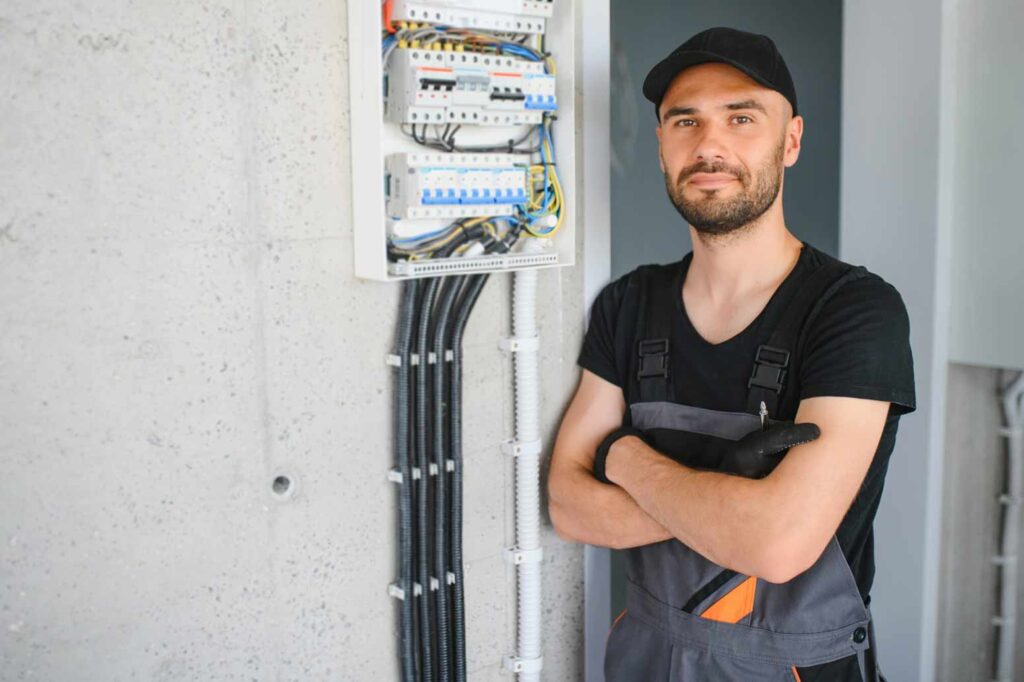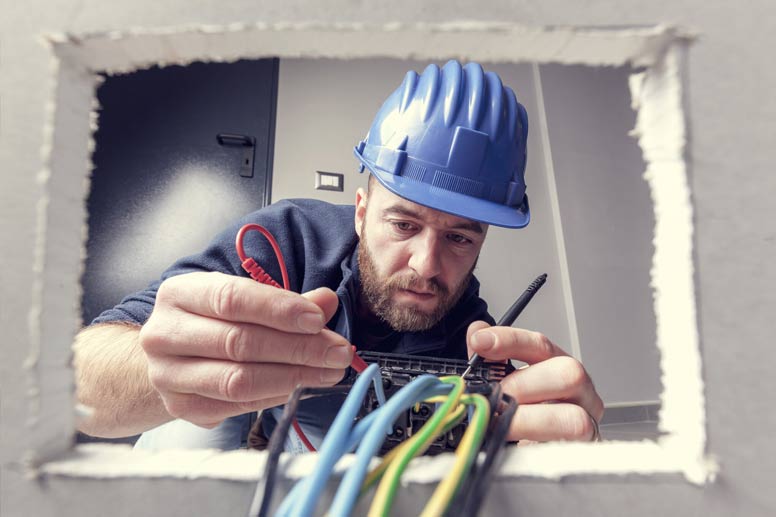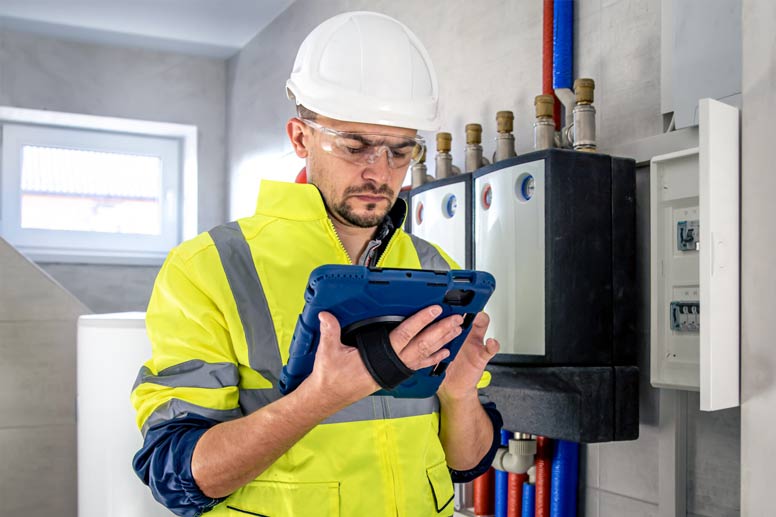How to Get an Electrical License in 5 Simple Steps?

Table of Contents
As the U.S. faces a growing need for skilled electricians, obtaining an electrical license has never been more critical.
According to the Bureau of Labor Statistics, demand for electricians is projected to grow 11% from 2023 to 2033. This is much faster than the average for all occupations.
Starting as an apprentice or advancing in your career, getting licensed improves your credibility. Additionally it opens doors to better-paying jobs and bigger projects.
Understanding the licensing process may seem overwhelming at first. Breaking it down into clear steps makes it much more manageable.
In this guide, we’ll explore the step-by-step process. Obtaining an electrician license, including state-specific requirements, license types, and actionable tips to help you succeed.
Why Do I Need an Electrician License?
Working as an electrician without a license is illegal in most states and comes with risks. These include fines, job restrictions, and a lack of credibility.
Why getting licensed matters:
- Legal Compliance: Licensing ensures you meet state and local requirements.
- Credibility: Clients and employers trust licensed electricians, as it demonstrates professionalism and expertise.
- Higher Pay: Licensed electricians earn significantly more than unlicensed workers.
- Access to Larger Projects: With a license, you can bid on commercial, industrial, and government contracts.
Pro Tip: Licensed electricians often earn 10-15% more than their unlicensed counterparts.

Types of Electrician Licenses
Electrician licenses vary depending on your experience and the type of work you plan to do. Here are the most common types:
Apprentice Electrician License
For beginners working under a licensed journeyman or master electrician.
Journeyman Electrician License
Allows you to work independently on residential and commercial projects.
Master Electrician License
The highest level, enabling you to supervise other electricians and handle large-scale projects.
Electrical Contractor License
Required if you plan to operate your own business or hire other electricians.

State-Specific Licensing Requirements
Each state has its own licensing process. We’ve breakdown of requirements for major states and regions:
California Electrical License
- Types: General Electrician, Residential Electrician, Fire/Life Safety Technician.
- Requirements: 8,000 hours of on-the-job training. Pass a state exam based on the National Electrical Code (NEC).
- Cost: Application fees range from $200 to $300.
Florida Electrical License
- Types: Registered Contractor, Certified Contractor.
- Requirements: 4 years of work experience, pass the Florida Electrical Contractor Licensing Exam.
- Cost: Application fees start at $300.
Texas Electrician Apprentice License
- Types: Apprentice, Journeyman, Master Electrician.
- Requirements: Complete an apprenticeship program and pass the Texas Electrical Exam.
- Cost: Licensing fees range from $25 to $50 for apprentices, up to $100 for journeymen.
New York Electrical License
- Requirements: Varies by municipality (e.g., NYC requires a minimum of 7.5 years/10,500 hours of experience).
- Cost: Application fees range from $200 to $500, depending on the city.
Illinois Electrical License
- Requirements: No statewide licensing; local jurisdictions set requirements.
- Example: Chicago requires 8,000 hours of experience and a passing score on the Chicago Electrical Licensing Exam.
Nevada Electrical License
- Requirements: 4 years of work experience and pass the Nevada State Contractors Board exam.
- Cost: Application fee is $300, with additional exam fees.
Washington Electrical License
- Requirements: 8,000 hours of supervised work and pass the state exam.
- Special Note: Washington also offers specialty licenses, such as for HVAC electricians.
- Pro Tip: Always check your state’s specific licensing board for the most accurate and up-to-date requirements.

How to Get Your Electrician License in 5 Steps:
1. Meet Educational Requirements
- Most states require a high school diploma, ged or equivalent.
- Take relevant courses in math, physics, and blueprint reading.
2. Complete an Apprenticeship
- Enroll in a state-approved apprenticeship program, typically lasting 4-5 years.
- Gain job experience under a licensed electrician while attending classroom sessions.
3. Pass the Electrical Licensing Exam
- Study state-specific electrical codes, safety regulations, and electrical theory.
- Utilize resources like practice tests and study guides.
4. Submit Your Application
- Gather necessary documents, including proof of experience and exam results.
- Pay the application fee.
5. Renew Your License
- Most licenses require renewal every 1-3 years.
- Complete hours of continuing education courses to stay updated on industry standards.
How Much Does an Electrician License Cost?
The cost of obtaining an electrician license varies by state and includes:
- Application Fees: $50 to $500
- Exam Fees: $50 to $300
- Renewal Fees: $50 to $250
- Training Costs: Apprenticeship programs may cost $1,000 to $5,000, depending on the provider.
Pro Tip: Many apprenticeships are paid positions, helping offset training program costs.

Is It Worth Being a Licensed Electrician?
Yes, getting your electrician license is a rewarding investment in your career. Look at it as your ticket to higher earnings, job security, and opportunities to grow in a booming industry.
- Increased Earning Potential: Licensed electricians earn $5,000 to $20,000 more annually than unlicensed workers.
- Job Security: Licensing ensures compliance with state laws, protecting your career.
- Opportunities for Growth: A license allows you to specialize in areas like renewable energy or smart home electrical systems.
When you’re ready to launch, discover how Invoice Fly can help you stay up to date with your electrical license and smooth your business processes.
Stay on top of operations and effortlessly take your business to the next level.
Electrical License FAQs
It typically takes 4-5 years to complete an apprenticeship and obtain a journeyman license. Master licenses may take an additional 1-2 years.
Yes, most states require an apprentice electrician license to work under supervision legally. For example, the California state electrical license is mandatory.
Journeyman licenses typically cost $100 to $300, including application and exam fees.
Some states have reciprocity agreements, but you may need to meet additional requirements. Always check with the state’s licensing board.
For example, the state of Florida electrical license is not interchangeable with Georgia. However, with the right amount of hours in Minnesota, the license is recognised in Arkansas.
In most states, you’ll need an electrical contractor license to operate your own business legally.
